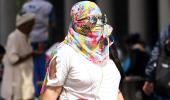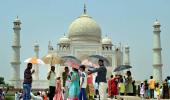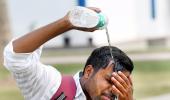Temperatures in several parts of Delhi again breached the 47 degrees Celsius mark on Monday, with the weather office issuing a 'red alert' for the next five days due to heatwave to severe heatwave conditions in the national capital.

The searing heat pushed the city's peak power demand to its highest for May, while the Delhi government directed the schools that have not closed for summer vacations to do so with immediate effect.
Delhi has been seeing a steady rise in temperature in recent days, culminating in the highest temperature recorded this summer on Sunday when the overall temperature reached 44.4 degrees Celsius. Saturday's temperature was 43.6 degrees Celsius, up from 42.5 degrees Celsius on Friday.
On Monday the national capital experienced the second-highest maximum temperature, 3.7 degrees above normal.
Najafgarh recorded a high of 47.4 degrees Celsius on Monday, a day after the southwest Delhi area had recorded 47.8 degrees Celsius -- the highest in the country so far this season.
Mungeshpur recorded 47.1 degrees, Aya Nagar recorded 45.7 degrees, Pusa recorded 46.1 degrees, Pitampura recorded 46.6 degrees, and Palam recorded 45.2 degrees.
The crippling heat is especially straining low-income households, which often have poor access to water and cooling, and testing the endurance of people who have to venture outside for work and other chores.
In a circular, the Directorate of Education in Delhi said all the schools were directed to observe summer vacation from May 11 to June 30 for this academic year.
"...all the govt. schools are closed wef 11.05.24. However, it has been observed that some of the govt. aided and unaided recognised private schools are still open during ongoing severe heat waves.
"Therefore, all the heads of govt. aided and unaided recognised private schools of Delhi are advised to close the schools for summer vacation with immediate effect," read the circular.
Realtime data from the State Load Dispatch Centre, Delhi, showed the peak power demand at 7,572 MW at 3:33 pm. This was the highest-ever peak power demand for Delhi in May. It was also higher than the peak power demand recorded last year -- 7,438 MW -- on August 22.
Not just the people but animals also are reeling under the sweltering heat wave. Delhi's National Zoological Park has stepped up its animal care efforts by making available water coolers, straw shelters, fruit ice balls, wall-hanging thermometers for temperature monitoring, and water showers to keep the animals cool.
The India Meteorological Department predicted mainly clear skies with heatwave conditions in many parts of Delhi and severe heatwave conditions in other areas, accompanied by strong surface winds at speeds of 25-35 kmph on Tuesday.
In a seven-day forecast, the IMD has urged "extreme care for vulnerable people" due to the heatwave.
There is a very high likelihood of developing heat-related illness and heat stroke in people of all ages, and a significant health concern for vulnerable individuals such as infants, the elderly, and those with chronic diseases.
"Avoid heat exposure and keep cool. Avoid dehydration," the IMD said.
The weather department has suggested drinking sufficient water and using ORS or homemade drinks such as lassi, torani (rice water), lemon water and buttermilk to stay hydrated.
The threshold for a heatwave is met when the maximum temperature of a weather station reaches at least 40 degrees Celsius in the plains, 37 degrees in the coastal areas, and 30 degrees in the hilly regions, and the departure from normal is at least 4.5 notches.
A severe heatwave is declared if the departure from normal exceeds 6.4 notches.
Delhi's relative humidity oscillated between 43 percent and 23 percent during the day.











 © 2025
© 2025